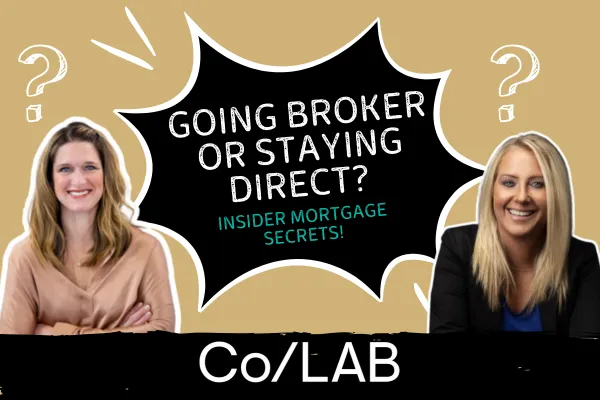BLOG
Mortgage, Real Estate, and Entrepreneurship


How to Leave Retail Lending and Become a Mortgage Broker in 2025
Should You Go Retail or Become a Mortgage Broker? What Loan Officers Need to Know
If you're a loan officer trying to decide whether to stay in retail lending or make the switch to become a mortgage broker—or even open your own brokerage—you’re not alone. This is a major career decision, and it can affect your income potential, flexibility, and long-term growth in the mortgage industry.
In this article, we break down the real differences between retail lending and mortgage brokering, featuring real insights from Heather Yuso, a seasoned loan officer who recently made the switch from retail to the broker channel. If you're wondering which path is right for you, read on to get the clarity and direction you need.
Retail Lending vs. Mortgage Broker: What’s the Difference?
At a high level, retail loan officers work for banks, credit unions, or direct mortgage lenders. These companies fund loans in-house and typically offer a fixed set of products and interest rates. Loan officers at retail lenders can usually only sell what their employer offers.
In contrast, mortgage brokers operate independently. They have access to dozens of wholesale lenders and can shop for the best product and rate for each borrower. Brokers act as intermediaries between borrowers and lenders, helping clients access a much wider range of loan products.
“At my retail lender, we never even talked about DSCR or Non-QM loans,” says Heather. “As a broker, I now work with 20+ lenders and can help clients I used to have to turn away.”
Transitioning from Retail to Broker: Is It Difficult?
Let’s be honest—making the switch isn't easy. You might have pending loans, established routines, and strong relationships at your retail job. But Heather insists it’s worth it.
“The transition was tough,” she says. “But now I have the ability to get my clients the best product and best interest rate instead of being stuck with just one option.”
She emphasizes that brokers don’t have to work with all 20 lenders all the time. If you prefer a consistent workflow, you can stick with one or two—but the flexibility is there when you need it.
Why Mortgage Brokers Close More Loans
One of the biggest advantages brokers have is the ability to close more deals by finding loan programs that fit non-traditional borrowers.
Let’s say you have a borrower with a high debt-to-income ratio but strong savings and good credit. At a retail lender, that deal might get denied. As a broker, you can place that borrower with a lender that has a specialized program, like a bank statement loan or DSCR loan (Debt Service Coverage Ratio).
“I’ve helped more clients as a broker in six months than I did in four years at retail,” Heather shares.
The Perks of Working at a Retail Lender
Retail lenders aren't all bad—and for many loan officers, they offer significant benefits:
In-house processing and underwriting: Everything is under one roof, which can streamline the process.
Brand recognition and stability: Larger institutions may carry more weight with borrowers.
Structured support systems: Think HR departments, compliance teams, marketing, and built-in training.
Benefits and salary options: Some retail lenders offer W2 salaries, retirement plans, and health insurance.
Heather acknowledges these strengths.
“The closers and processors were all in-house, and that made the closing process easier in many cases,” she says. “If you're someone who thrives on structure and predictability, retail could be a good fit.”
Why More Loan Officers Are Going Independent
Despite the structure retail offers, more loan officers are moving to the broker channel, and for good reason. Here are the top benefits:
1. Higher Income Potential
Brokers typically earn higher commission splits.
You have more flexibility in how deals are structured.
You can negotiate compensation with your brokerage.
“When I came over, I was offered more per file than I was making at my retail lender,” Heather says. “It was a no-brainer.”
2. More Control and Flexibility
You choose which lenders to work with.
You have control over your pricing, rate sheets, and fee structure.
You can build your own team and even open your own brokerage.
“I love that I can make decisions and learn from them. At a retail lender, I wasn’t even given the choice,” says Heather.
Picking the Right Brokerage Is Crucial
Not all brokerages are created equal. Some only offer access to a few lenders. Others don’t provide much support, leaving new brokers to sink or swim.
Before choosing a brokerage, ask:
How many wholesale lenders do they work with?
Do they offer in-house processing or marketing support?
Is there a collaborative team environment, or is it competitive?
Can you transition into ownership or leadership roles?
“One brokerage I spoke to only worked with three lenders. That’s not the kind of flexibility I was looking for,” Heather notes.
Do Brokers Get Enough Support?
One common myth about becoming a broker is that you’re completely on your own. While it’s true that you have more responsibility, the right brokerage can provide just as much—if not more—support than retail.
“At my brokerage, the owner stepped in on a tough deal and personally called the lender to help us get it closed. That kind of support made all the difference,” Heather explains.
In a strong broker network, you’ll also find community support among other loan officers. Instead of competing, brokers often share ideas, solutions, and referrals.
What About Marketing and Training?
Retail lenders often have internal marketing departments and training programs. But that doesn’t mean brokers are left in the dark.
Look for brokerages that offer:
Marketing templates and resources
CRM systems
Onboarding and mentorship
Ongoing training webinars or live events
“The brokerage I joined had everything digital. Onboarding was smooth. I got help every step of the way,” Heather says.
Choosing the Right Compensation Model
Some brokerages charge per-file fees and let you keep a higher split. Others offer full support but with slightly lower comp. You have to decide which model works best for your stage of growth.
Heather suggests starting with full support and transitioning as you get more comfortable.
“You don’t want to worry about everything right away. Get the training first, then consider switching to a model with fewer fees and more autonomy.”
Common Myths About Becoming a Broker
Let’s bust a few myths:
“You lose control.”
False. You actually gain control over pricing, compensation, and decision-making.
“There’s no support.”
Only if you choose the wrong brokerage. Many brokerages offer great support.
“It’s too hard to learn.”
Learning the broker channel is a process—but with mentorship, it’s absolutely doable.
Who Should Go Retail vs. Who Should Go Broker?
Here's a simple breakdown:
Choose Retail if:
You want stability and structure.
You prefer consistent processes.
You need company-provided leads, benefits, and training.
You don’t want to worry about running a business.
Choose Broker if:
You want higher earning potential.
You like flexibility and freedom.
You want to offer more loan products.
You plan to build a team or open your own brokerage.
You want control over your pricing, brand, and career path.
“I’m not going back to retail,” says Heather. “This change gave me more freedom, more income, and a stronger community.”
Frequently Asked Questions (FAQs)
Q1: Is becoming a mortgage broker riskier than staying in retail lending?
A: It can be, depending on your business experience and mindset. Mortgage brokers have more control and flexibility but also take on more responsibility for operations, compliance, and lead generation. With the right support and knowledge, the broker model can be less risky long-term due to better pricing and multiple lending options.
Q2: Do I need a lot of money to start my own mortgage broker business?
A: Not necessarily. While startup costs exist—like licensing, technology, and marketing—they are often lower than expected, especially compared to launching a traditional business. Many brokers start lean and scale over time. Partnerships and platforms like Co/LAB can also help reduce upfront expenses.
Q3: What are the biggest challenges new brokers face when leaving retail lending?
A: The top challenges include adjusting to self-management, choosing the right lender partners, learning compliance requirements, and building a client pipeline from scratch. However, with mentorship and access to training, these hurdles are very manageable.
Q4: Will I still have access to competitive loan products as a broker?
A: Yes—and in most cases, even more than before. Mortgage brokers have access to dozens of lenders and loan programs, including conventional, FHA, VA, USDA, non-QM, and specialized investor products. This variety allows brokers to better serve a diverse client base.
Q5: How long does it take to transition from loan officer to mortgage broker owner?
A: The timeline varies by state and your current licensing status, but many professionals can make the shift in 60–90 days. With a focused plan, guidance, and the right partnerships, the transition can be smooth and efficient.
Final Thoughts: Do Your Homework
Making the move from retail to broker isn’t something to take lightly. But if you’ve hit a ceiling at your current lender, it might be time to consider a new path.
“Reach out. Ask questions. Don’t make the decision in a vacuum,” advises Heather.
You can always start by joining a brokerage with strong support, learn the ropes, and transition into ownership when you're ready.
At Co/LAB, we don’t just help people become brokers—we help them succeed. Whether you’re a loan officer looking for better comp, more control, or a path to ownership, we can connect you with the right team and the right training.
Need help navigating your next move?
Reach out to our team at Co/LAB. We’re here to help you decide if the broker channel is the right fit—and how to get there.
Megan Marsh
CEO/ FOUNDER of Co/LAB Broker Concierge
In Case You Missed Our Previous Blogs & YouTube Videos..
Read Here: How to Become a Self-Employed Mortgage Broker: Step-by-Step Guide
Ready to be your own boss? Discover how to become a self-employed mortgage broker with this ultimate guide. From licensing and startup costs to client acquisition and scaling your business, learn exactly how to take control of your income, freedom, and future in the mortgage industry.
Read Here: Mortgage Broker Compliance Guide: Avoid Costly Mistakes & Prepare for Audits
Compliance is the #1 reason mortgage brokerages get fined or fail. Learn how to set up simple systems to stay audit-ready, avoid costly mistakes, and grow your business the right way.
Mortgage Broker Support
Need help starting your mortgage business? Our Mortgage Broker Concierge Team is here to assist you!
If you’re curious about how we can help you simplify your operations beyond what our videos offer and want to know how you can make launching or running your brokerage stress-free, the link below explains everything. No fluff, no “exclusive training” gimmicks—just a straightforward way to see how we work with brokers to take backend tasks off their plates. Check it out here: https://colablendingfranchise.com/book-a-discovery-call

How to Leave Retail Lending and Become a Mortgage Broker in 2025
Should You Go Retail or Become a Mortgage Broker? What Loan Officers Need to Know
If you're a loan officer trying to decide whether to stay in retail lending or make the switch to become a mortgage broker—or even open your own brokerage—you’re not alone. This is a major career decision, and it can affect your income potential, flexibility, and long-term growth in the mortgage industry.
In this article, we break down the real differences between retail lending and mortgage brokering, featuring real insights from Heather Yuso, a seasoned loan officer who recently made the switch from retail to the broker channel. If you're wondering which path is right for you, read on to get the clarity and direction you need.
Retail Lending vs. Mortgage Broker: What’s the Difference?
At a high level, retail loan officers work for banks, credit unions, or direct mortgage lenders. These companies fund loans in-house and typically offer a fixed set of products and interest rates. Loan officers at retail lenders can usually only sell what their employer offers.
In contrast, mortgage brokers operate independently. They have access to dozens of wholesale lenders and can shop for the best product and rate for each borrower. Brokers act as intermediaries between borrowers and lenders, helping clients access a much wider range of loan products.
“At my retail lender, we never even talked about DSCR or Non-QM loans,” says Heather. “As a broker, I now work with 20+ lenders and can help clients I used to have to turn away.”
Transitioning from Retail to Broker: Is It Difficult?
Let’s be honest—making the switch isn't easy. You might have pending loans, established routines, and strong relationships at your retail job. But Heather insists it’s worth it.
“The transition was tough,” she says. “But now I have the ability to get my clients the best product and best interest rate instead of being stuck with just one option.”
She emphasizes that brokers don’t have to work with all 20 lenders all the time. If you prefer a consistent workflow, you can stick with one or two—but the flexibility is there when you need it.
Why Mortgage Brokers Close More Loans
One of the biggest advantages brokers have is the ability to close more deals by finding loan programs that fit non-traditional borrowers.
Let’s say you have a borrower with a high debt-to-income ratio but strong savings and good credit. At a retail lender, that deal might get denied. As a broker, you can place that borrower with a lender that has a specialized program, like a bank statement loan or DSCR loan (Debt Service Coverage Ratio).
“I’ve helped more clients as a broker in six months than I did in four years at retail,” Heather shares.
The Perks of Working at a Retail Lender
Retail lenders aren't all bad—and for many loan officers, they offer significant benefits:
In-house processing and underwriting: Everything is under one roof, which can streamline the process.
Brand recognition and stability: Larger institutions may carry more weight with borrowers.
Structured support systems: Think HR departments, compliance teams, marketing, and built-in training.
Benefits and salary options: Some retail lenders offer W2 salaries, retirement plans, and health insurance.
Heather acknowledges these strengths.
“The closers and processors were all in-house, and that made the closing process easier in many cases,” she says. “If you're someone who thrives on structure and predictability, retail could be a good fit.”
Why More Loan Officers Are Going Independent
Despite the structure retail offers, more loan officers are moving to the broker channel, and for good reason. Here are the top benefits:
1. Higher Income Potential
Brokers typically earn higher commission splits.
You have more flexibility in how deals are structured.
You can negotiate compensation with your brokerage.
“When I came over, I was offered more per file than I was making at my retail lender,” Heather says. “It was a no-brainer.”
2. More Control and Flexibility
You choose which lenders to work with.
You have control over your pricing, rate sheets, and fee structure.
You can build your own team and even open your own brokerage.
“I love that I can make decisions and learn from them. At a retail lender, I wasn’t even given the choice,” says Heather.
Picking the Right Brokerage Is Crucial
Not all brokerages are created equal. Some only offer access to a few lenders. Others don’t provide much support, leaving new brokers to sink or swim.
Before choosing a brokerage, ask:
How many wholesale lenders do they work with?
Do they offer in-house processing or marketing support?
Is there a collaborative team environment, or is it competitive?
Can you transition into ownership or leadership roles?
“One brokerage I spoke to only worked with three lenders. That’s not the kind of flexibility I was looking for,” Heather notes.
Do Brokers Get Enough Support?
One common myth about becoming a broker is that you’re completely on your own. While it’s true that you have more responsibility, the right brokerage can provide just as much—if not more—support than retail.
“At my brokerage, the owner stepped in on a tough deal and personally called the lender to help us get it closed. That kind of support made all the difference,” Heather explains.
In a strong broker network, you’ll also find community support among other loan officers. Instead of competing, brokers often share ideas, solutions, and referrals.
What About Marketing and Training?
Retail lenders often have internal marketing departments and training programs. But that doesn’t mean brokers are left in the dark.
Look for brokerages that offer:
Marketing templates and resources
CRM systems
Onboarding and mentorship
Ongoing training webinars or live events
“The brokerage I joined had everything digital. Onboarding was smooth. I got help every step of the way,” Heather says.
Choosing the Right Compensation Model
Some brokerages charge per-file fees and let you keep a higher split. Others offer full support but with slightly lower comp. You have to decide which model works best for your stage of growth.
Heather suggests starting with full support and transitioning as you get more comfortable.
“You don’t want to worry about everything right away. Get the training first, then consider switching to a model with fewer fees and more autonomy.”
Common Myths About Becoming a Broker
Let’s bust a few myths:
“You lose control.”
False. You actually gain control over pricing, compensation, and decision-making.
“There’s no support.”
Only if you choose the wrong brokerage. Many brokerages offer great support.
“It’s too hard to learn.”
Learning the broker channel is a process—but with mentorship, it’s absolutely doable.
Who Should Go Retail vs. Who Should Go Broker?
Here's a simple breakdown:
Choose Retail if:
You want stability and structure.
You prefer consistent processes.
You need company-provided leads, benefits, and training.
You don’t want to worry about running a business.
Choose Broker if:
You want higher earning potential.
You like flexibility and freedom.
You want to offer more loan products.
You plan to build a team or open your own brokerage.
You want control over your pricing, brand, and career path.
“I’m not going back to retail,” says Heather. “This change gave me more freedom, more income, and a stronger community.”
Frequently Asked Questions (FAQs)
Q1: Is becoming a mortgage broker riskier than staying in retail lending?
A: It can be, depending on your business experience and mindset. Mortgage brokers have more control and flexibility but also take on more responsibility for operations, compliance, and lead generation. With the right support and knowledge, the broker model can be less risky long-term due to better pricing and multiple lending options.
Q2: Do I need a lot of money to start my own mortgage broker business?
A: Not necessarily. While startup costs exist—like licensing, technology, and marketing—they are often lower than expected, especially compared to launching a traditional business. Many brokers start lean and scale over time. Partnerships and platforms like Co/LAB can also help reduce upfront expenses.
Q3: What are the biggest challenges new brokers face when leaving retail lending?
A: The top challenges include adjusting to self-management, choosing the right lender partners, learning compliance requirements, and building a client pipeline from scratch. However, with mentorship and access to training, these hurdles are very manageable.
Q4: Will I still have access to competitive loan products as a broker?
A: Yes—and in most cases, even more than before. Mortgage brokers have access to dozens of lenders and loan programs, including conventional, FHA, VA, USDA, non-QM, and specialized investor products. This variety allows brokers to better serve a diverse client base.
Q5: How long does it take to transition from loan officer to mortgage broker owner?
A: The timeline varies by state and your current licensing status, but many professionals can make the shift in 60–90 days. With a focused plan, guidance, and the right partnerships, the transition can be smooth and efficient.
Final Thoughts: Do Your Homework
Making the move from retail to broker isn’t something to take lightly. But if you’ve hit a ceiling at your current lender, it might be time to consider a new path.
“Reach out. Ask questions. Don’t make the decision in a vacuum,” advises Heather.
You can always start by joining a brokerage with strong support, learn the ropes, and transition into ownership when you're ready.
At Co/LAB, we don’t just help people become brokers—we help them succeed. Whether you’re a loan officer looking for better comp, more control, or a path to ownership, we can connect you with the right team and the right training.
Need help navigating your next move?
Reach out to our team at Co/LAB. We’re here to help you decide if the broker channel is the right fit—and how to get there.
Megan Marsh
CEO/ FOUNDER of Co/LAB Broker Concierge
In Case You Missed Our Previous Blogs & YouTube Videos..
Read Here: How to Become a Self-Employed Mortgage Broker: Step-by-Step Guide
Ready to be your own boss? Discover how to become a self-employed mortgage broker with this ultimate guide. From licensing and startup costs to client acquisition and scaling your business, learn exactly how to take control of your income, freedom, and future in the mortgage industry.
Read Here: Mortgage Broker Compliance Guide: Avoid Costly Mistakes & Prepare for Audits
Compliance is the #1 reason mortgage brokerages get fined or fail. Learn how to set up simple systems to stay audit-ready, avoid costly mistakes, and grow your business the right way.
Mortgage Broker Support
Need help starting your mortgage business? Our Mortgage Broker Concierge Team is here to assist you!
If you’re curious about how we can help you simplify your operations beyond what our videos offer and want to know how you can make launching or running your brokerage stress-free, the link below explains everything. No fluff, no “exclusive training” gimmicks—just a straightforward way to see how we work with brokers to take backend tasks off their plates. Check it out here: https://colablendingfranchise.com/book-a-discovery-call
Are You Ready...
to Start Building a Legacy and Not Just a Business?
AS FEATURED IN:







Co/LAB Corporate
8795 Peach Street,
Erie, PA 16509
Company
Resources
Learn more about who we are, what we do, and how we can help you by visiting our other company websites.
www.becomeamortgagebroker.info





